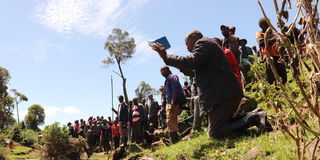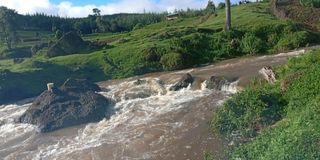Kuongelesha maji: Inside strange traditions practiced when persons drown

A Kalenjin elder conducts rituals beside River Ndarugu asking that bodies of two sisters who drowned in the river be found.
As in many of our cultures, traditions and customs are meant to be sacred and the Kalenjin community is no different.
One of the traditions they uphold to date is what happens when someone drowns.
Mtaa Wangu has learnt that the elderly men hold a ritual where they speak to the water so that the body of the deceased is found.

A section of River Ndarugu in Njoro sub county.
Where there’s no specific number of elderly men required, men above the age of 35 have also been seen to join the ritual.
This is done to appease the ancestors and seek mercy so that such an incident doesn't happen again.
Culturally, women and children are not allowed as a tradition.
This has changed over time as previously when one drowned, one would be buried by the river where the body was found. Additionally, some men have abandoned the ritual as religion has shifted their perspective.
In the Kamba community, Teresia* informs us that in the past, there was a belief that when someone drowned, men and women of age would gather by the water body and offer prayers while grinding leaves from a specific tree and throwing them into the water where the incident occurred.
This was done to appease the spirits of the waters.
She adds that once the body was retrieved, they’d take sand from the river and preserve the body with it until the date of internment.
Teresia also mentions a belief that when crossing the river, it was important not to look down, as it was believed that the waves were laughing and could 'carry' you away.
Therefore, to avoid drowning, it was believed one needed to be unclean, and the only way to achieve this was by smoking a cigarette, as it was thought to displease the spirits of the waters.
This tradition has long phased out as more people have turned to religion as their primary belief system.
In the Luo community, when someone drowns, relatives of the deceased invoke their name through praise for them to be found and not get lost in the water, says Lucas Ouma.
He adds that when this happens, some family members go at sea while others stay ashore and light a bonfire till the day the deceased is found.
He continues by noting that some elements of these traditions have changed over time. For instance, previously, when one drowned and the body was retrieved, they were immediately buried outside the homestead. Now they are taken to the morgue for proper internment.

Residents of Njoro watch from a distance as local divers search for the bodies of two sisters who drowned in the river on May 6, 2024.
Additionally, those who found the body would stay with it until the funeral was held and would not go back home. Now, after accompanying the deceased to the hospital, they are allowed to go back to their homes and await the burial.
He concluded that, in the event the body is not found, a banana stem is buried to give the family closure.
